Meeting with representatives of the development and launch of satellites
Inspire the people of the whole country
On the night of the first International Labor Day in the 1970s, Mao Zedong met with representatives of the development and launch of Long March rockets and Dongfanghong satellites on the Tiananmen Gate, reflecting his concern for the aerospace industry and his encouragement to astronauts.
After the satellite launch was successful, Zhou Enlai arranged for the development and launch personnel to participate in the observation of the Tiananmen Gate Tower on the evening of the "May Day" International Labor Day.
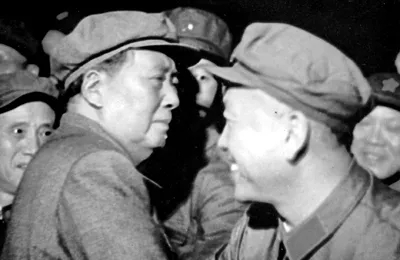
▲ On May 1, 1970, Chairperson Mao received representatives of the personnel who developed and launched the "Dongfanghong-1" satellite
Warmly shake hands with the delegates, express condolences and congratulations
The seats of the delegates were carefully arranged at the exit of the elevator on the west side of the city building, which is where the central chiefs have to go back and forth. That night, Mao Zedong, Zhou Enlai and others accompanied Prince Sihanouk to the Tiananmen Gate Tower, and Chinese and foreign guests celebrated the festival of working people all over the world.
The leading comrades who specifically organized the implementation of the task, as well as the representatives of the research and development and launch test units, stood in formation on the long corridor to the right of Tiananmen Gate to watch the celebration.
Zhou Enlai guided Mao Zedong to the front of the team and introduced:
Chairperson, they are the staff representatives of the development and launch of satellites, and they just arrived in Beijing yesterday.
Mao Zedong smiled and happily shook hands with the delegates one by one, expressing his cordial condolences and congratulations.
The films shot by photographers back then left us with precious images, the excited smiles of astronauts and the images of shouting slogans, which have been indelibly recorded in the history of the development of New China and the struggles of astronauts.
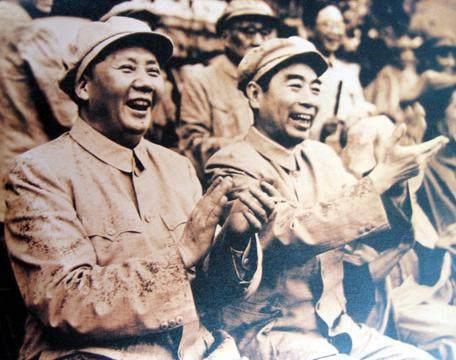
▲ Mao Zedong and Zhou Enlai
The second handshake and the long viewing ceremony made the astronauts unforgettable
After the party, when Zhou Enlai led Mao Zedong to withdraw, he walked past the representatives of the satellite launch, who competed to shake hands with Mao Zedong for the second time.
At that time, Liu Fuyu, the leader of the electrical measurement team of the satellite assembly workshop who did not catch up with the first handshake, recalled this incident decades later:
By the time they arrived at Tiananmen Gate, the party had already begun.
Qian Xuesen said regretfully:
Chairperson Mao has already received our delegation, but you missed it.
Unexpectedly, Mao Zedong received the delegation for the second time, and he finally shook hands with Chairperson Mao happily.
The satellite launch was successful! Mao Zedong offered his condolences to Qian Xuesen’s team at the Tiananmen Gate and shook hands one by one.
There was another detail that also left a deep impression on the astronauts who attended the party. On the night of "May Day", Mao Zedong spent a long time in Tiananmen Square.
According to Wang Shengyuan, who was in charge of satellite surveying and received by Mao Zedong at the time, he recalled:
I remember Wei Tongtai (the head of the Seven Aircraft Department) said at the time that he had participated in three such celebrations. The first two times, Chairperson Mao left before the fireworks were released. This time Chairperson Mao was very happy and left after all the fireworks were released.
Mao Zedong cordially received the successful personnel who developed and launched satellites, which inspired the fighting spirit of the vast number of astronauts and encouraged the construction of a modern socialist power.
Tell the astronauts not to be proud
To launch more Chinese satellites
After China’s first satellite was launched, Mao Zedong brought up the topic of satellites many times in his conversations with foreign guests over the past two years.
The central idea we read from this is that China has only launched one satellite, which is nothing. Mao Zedong’s arguments at the time were quite intriguing.
Wang Zhanhua, a satellite launch representative who attended the "May Day" Tiananmen ceremony, recalled:
Chairperson Mao said to the people that there are more than 2,000 satellites in the sky, and we are only one in 2,000! Even if there are 2,000 satellites, we can’t be proud, otherwise we will go to the opposite side. This is a lesson. All of us were deeply encouraged and promptly organized all units to study Chairperson Mao’s instructions carefully.
The 2013 "Chronicle of Mao Zedong" revealed similar words from later Mao Zedong, and more than one time. Mao Zedong’s words are slightly different and his meaning is slightly different.
There are so many satellites rotating in the sky, and the Chinese satellite is not a big deal
"Not so much admiration" for China’s satellite launch. On July 13, 1970, Mao Zedong met with a French government delegation. When the guest said that President Pompidou admired China’s scientific efforts, Mao Zedong said:
Just started, experimental. China is not a big country, I don’t believe it when the newspapers say it.
When Bettencourt said she admired China for releasing its own satellites, Mao Zedong said:
I don’t admire it that much, it’s nothing. Because there are so many satellites in the sky, all of them belong to those two countries. What do our countries count as two satellites?
The word used here is "not so admired", which is a reversal of the idea that guests "admire China very much," so it is "nothing". It is "pitiful" to think that launching a satellite is "pitiful". It is said that foreigners "always blow us away".
On September 23, 1970, during a meeting with Vietnamese leaders, he said:
China is not a big country, but a medium country. I debated this issue with France Bettencourt. In a way, we are not even as good as France. How can we be considered a big country?
He always boasted to us that you put a satellite in the sky. I said there are so many satellites in the sky every day, and we only have one, what is it?
The word used here is "what"! Westerners always exaggerate. This conversation can also provide a footnote to our understanding of the debate on "admiration" and "disadmiration" in the July 13 conversation.
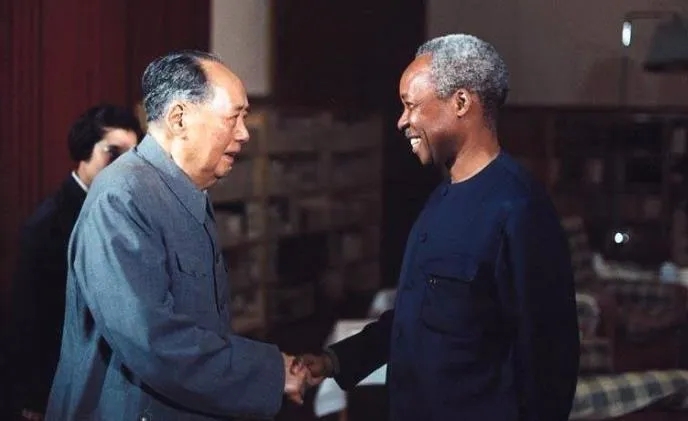
Mao Zedong receives foreign guests
Launching a satellite is very pitiful, worrying about how to improve the economy
On July 20, 1970, Mao Zedong met with Congolese guests and said:
There are too many people in China, which is not commensurate with economic development. You are worried about your economy now, and we are also worried about how to improve it. It is not about building a few atomic bombs and launching a few satellites, which is very pitiful. There are many man-made satellites in this sky, all of which are owned by the United States and the Soviet Union. Only France and Japan have run up there. Recently, China has run up one.
The word "pitiful" is used after enumerating the first few countries to launch satellites, and asking "how to get the economy going" is the important question. Humbly put "only two".
On the evening of July 10, 1972, during a meeting with French Foreign Minister Schumann at Zhongnanhai Swimming Pool, Mao Zedong said of the tensions between China and the Soviet Union:
You hit yours, I’ll hit mine. We’ll use the same method we used to hit Chiang Kai-shek and the Japanese.
There are not as many atomic bombs as the Soviet Union, and we only put two satellites in the sky.
The phrase used here is "only two", at a time when China’s space program is in full swing.
Using the afterglow of life to illuminate the future of China’s aerospace industry
In his later years, Mao Zedong’s health and energy were getting worse, but his gaze still did not leave China’s aerospace progress.
When the Dongfanghong satellite was in full swing, on June 17, 1968, Mao Zedong approved the development of the ocean-going survey ship project, code-named "718 Project", which was later named after Mao Zedong’s handwritten poem "Far View" by Marshal Ye Jianying. They participated in the measurement and control tasks of almost all major space activities after launching long-range carrier rockets into the Pacific Ocean (code-named "580 Project").
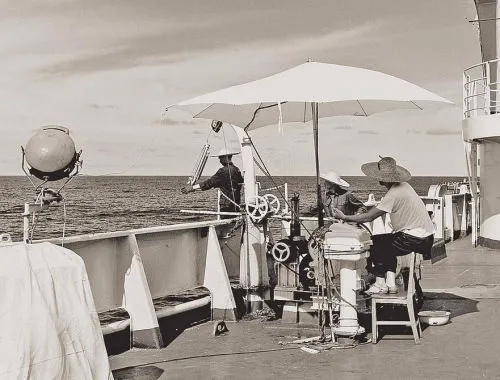
China’s first ocean-going survey researchers work on deck
On July 14, 1970, Mao Zedong read the National Defense Science and Technology Commission’s "Plan Report on Astronaut Selection" and directed the launch of China’s manned spaceflight program, code-named "714 Project", which was an early rehearsal of China’s manned spaceflight program.
On March 31, 1975, Mao Zedong read the "Report on the Development of Satellite Communication Problems in our country", code-named "Project 331", which led to the "Dongfanghong No. 2" communications satellite that later jumped 36,000 kilometers away from the earth.
On November 26, 1975, the ill Mao Zedong reviewed the report of our country’s launch of remote sensing satellites, and then reviewed the relevant information sent back by the satellites.
Mao Zedong’s earnest instructions and aerospace layout have made the vast number of astronauts modest and cautious, making persistent efforts to promote China’s aerospace industry to make great strides into space.
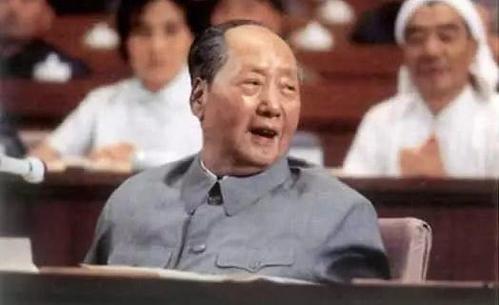
▲ Chairperson Mao at the meeting
Nowadays, two tapes of "The East is Red" music from space lie quietly in the display case of the Comrade Mao Zedong Memorial Hall, telling the touching story to future generations.
The music of "The East is Red" sings the song in the chest of Chinese astronauts, accompanied by the rhyme of building a aerospace power, and becomes a lasting song of singing China’s aerospace and Chinese dreams.
The emotions and longing of the Chinese people expressed in "The East is Red" complement each other with the great Chinese road, Chinese strength and Chinese spirit, and compose a beautiful movement of the great rejuvenation of the Chinese nation!